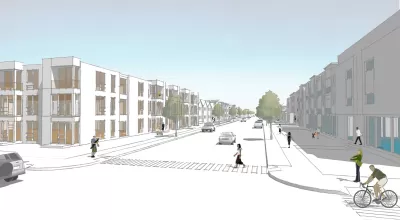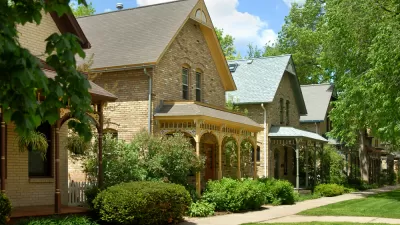The vision set forth in one of the most ambitious and groundbreaking comprehensive plans in recent memory has yet to align with the practical realities of zoning in Minneapolis.

The implementation of the Minneapolis 2040 Comprehensive Plan—the first plan to eliminate single-family zoning citywide in a large U.S. city—is proving more difficult than anticipated due to challenges aligning the city’s zoning code with the vision set forth in the comprehensive plan.
“Despite the 2040 Comprehensive Plan's elimination of single-family zoning four years ago, zoning codes have not yet been updated to align with the plan, making it hard to redevelop lots into multifamily housing,” according to an article by Susan Du for the Star Tribune.
Case in point: a triplex development proposed for vacant properties in North Minneapolis.
“Lena Gardner's vision for a slate of vacant properties in north Minneapolis was exactly what city leaders said they want: denser, more affordable housing on former single-family lots,” according to the article. “The neighborhood supported it. The city offered her nonprofit, Black Lives of Unitarian Universalism (BLUU), assistance to fund it.”
Still, planning staff and a City Council rejected the project, compelling Lena Gardner to scale it back.
More details on how a project with full support from the neighborhood and a development plan fully supported by the city’s comprehensive plan ran afoul of the city’s zoning code can be found in the source article below.
More from Planetizen: “Minneapolis 2040 Implementation Allowed to Proceed … For Now” (July 28, 2022)
FULL STORY: Plan to build triplexes in north Minneapolis runs into obstacles

Alabama: Trump Terminates Settlements for Black Communities Harmed By Raw Sewage
Trump deemed the landmark civil rights agreement “illegal DEI and environmental justice policy.”

Planetizen Federal Action Tracker
A weekly monitor of how Trump’s orders and actions are impacting planners and planning in America.

The 120 Year Old Tiny Home Villages That Sheltered San Francisco’s Earthquake Refugees
More than a century ago, San Francisco mobilized to house thousands of residents displaced by the 1906 earthquake. Could their strategy offer a model for the present?

In Both Crashes and Crime, Public Transportation is Far Safer than Driving
Contrary to popular assumptions, public transportation has far lower crash and crime rates than automobile travel. For safer communities, improve and encourage transit travel.

Report: Zoning Reforms Should Complement Nashville’s Ambitious Transit Plan
Without reform, restrictive zoning codes will limit the impact of the city’s planned transit expansion and could exclude some of the residents who depend on transit the most.

Judge Orders Release of Frozen IRA, IIJA Funding
The decision is a victory for environmental groups who charged that freezing funds for critical infrastructure and disaster response programs caused “real and irreparable harm” to communities.
Urban Design for Planners 1: Software Tools
This six-course series explores essential urban design concepts using open source software and equips planners with the tools they need to participate fully in the urban design process.
Planning for Universal Design
Learn the tools for implementing Universal Design in planning regulations.
Clanton & Associates, Inc.
Jessamine County Fiscal Court
Institute for Housing and Urban Development Studies (IHS)
City of Grandview
Harvard GSD Executive Education
Toledo-Lucas County Plan Commissions
Salt Lake City
NYU Wagner Graduate School of Public Service





























